
You Say Pyrokinesis, I Say Fire Porn
This is part five in the series, "The Decade Long Stephen King Cinematic Orgy." For more, see the posts on "Children of the Corn", with an introduction to the series, "Christine", "Cujo", and "Silver Bullet". There be spoilers ahead.
In 1984, Stephen King published, with Peter Straub, "The Talisman." It was the 11th novel in 10 years for King — this on top of his various short fiction that had been published in a variety of places and collected into a couple of collections. 1984 also saw the release of the film version of "Children of the Corn," which was followed two months later by "Firestarter." Combined, these two films showed the first signs of fatigue in the seemingly unstoppable Stephen King filmmaking machine.
"Children of the Corn" was the first King short story to get its own feature length treatment, and while "Firestarter" was King's sixth novel, it was the ninth film made (it was leap-frogged by both "Cujo" and "Christine"). After spending only a couple of minutes with it, the reasons for this hesitation on the part of the filmmakers becomes clear to anyone with passing knowledge of other King films.
"Firestarter" isn't really a horror film, at least not in the purest sense of the genre, and that's because "Firestarter" was never conceived as a pure horror novel. Instead, the story first appeared in serialized form in the now-defunct-but-at-the-time-famous science fiction magazine OMNI. The narrative and themes at play in the work certainly bare close resemblance to other King works, but the writer was decidedly thinking sci-fi when he conceived this work. When the filmmakers got their hands on it however, they needed to capitalize on the King name, and that meant marketing a horror film.
It will likely come as little surprise that the final product — bursting forth as it does from the writer of "Conan the Destroyer" (the second one) and the director of "Commando" (aka "Rambo" with Schwarzenegger) — never really manages to hit its stride. It's probably for the best though, as "Firestarter" today stands as a warning to others of what can happen when you try to cram every King story into a horror rubric.
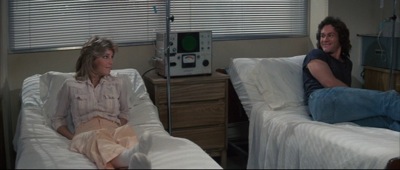
This was the second time I had been through "Firestarter", the first having come maybe a dozen years ago after I had finished reading the novel. At the time, I likely thought the movie adequate because if there's one nice thing I can say about it today, it's that the film mirrors the book almost to a T. In both cases, our protagonist is Charlie, a pre-adolescent girl with some family issues. It turns out that Charlie's parents — Andy and Vicky — met in college when they both took part in a secret government drug experiment. We've all been there: you're sitting in an uncomfortable hospital bed, whacked out on some freaky drug, only to look over and find the love of your life.
For Andy and Vicky this situation lead first to romance and then to marriage, and eventually to being hunted by a mysterious government agency. For you see, that fated experiment was being run by a shadowy organization known as "The Shop," and while things didn't work out all that famously for most of the participants, Vicky and Andy's love sprouted Charlie.
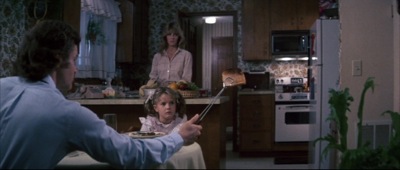
Though its largely brushed out of the way in the film, The Shop's mystery drug works on the endocrine system to create psycho-kinetic abilities. Imagine everyone's surprise when the initial participants — including Andy and Vicky — developed only the mildest of ESPs, but their progeny became imbued with seemingly limitless metnal abilities.
While Charlie's abilities cover the entire range from telekinetic to telepathic, she's particularly adept at starting fires: that's pyrokinesis for those of you keeping score. At first Andy, Vicky and Charlie live by my family's old mantra: The family that performs bizarre psychokinetic practice sessions together is the family that stays together. Andy and Vicky had largely been living outside of The Shop's view, and they figured that if they could train Charlie to control her abilities, then all would be well. As this is a Stephen King story, it goes without saying that this plan didn't exactly work out.
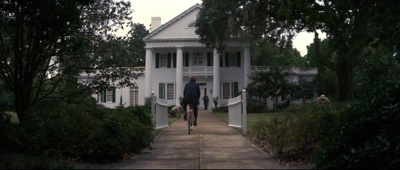
In many ways the very existence of The Shop establishes that this is not a typical Stephen King horror story. Despite efforts by King (picked up in full by the filmmakers) to connect The Shop with a Southern Gothic aesthetic — replete with rotting swamp and antebellum architecture — the organization is defined by the science fiction elements at play. Behind their defunct-plantation facade, The Shop has a state of the art (for 1984) research facility full of crazy computer-like machines and walls of monitors. They are tasked with cooking up wild parapsychology experiments and then defending themselves from the bureaucracy when those same experiments don't pan out. The Shop is, in many ways, another branch of the "Big Brother" style paranoia that pervades many genre stories, but even still the organization is much more grounded in reality than say The Overlook hotel, He Who Walks Behind the Rows, the pet cemetery or It. That is to say that what The Shop does is banal to the point of, well, boredom. Until they catch wind of Charlie.
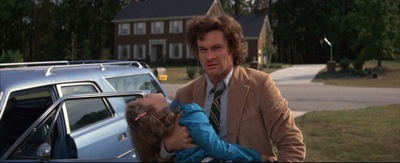
At the movie's open, Andy and Charlie are already on the run. In fact, they've been on the run, and it's only through flashback that we are filled in on most of the back story. The idyllic life that the family had been leading was shattered when Andy returned home one day from work to find Vicky murdered and three men absconding with Charlie. Only through deploying his own, weak yet effective power, is Andy able to save his daughter and go on the lamb.
Through this experience, we are able to see how Andy's relationship with The Shop evolved. Until Vicky's death, the organization was a nuisance at worst. But once he's on the run, they become the monster of the film. It's not long before generic white men in generic blue suits begin popping up everywhere. This again is different from many (or even most) King films in that the antagonist is concretely defined, and acts with clear objectives. The Shop may be nebulous in size, but what they want is clear, and the anxiety in the film derives from their seeming invincibility. The decision is made early on to expose the inner workings of The Shop, and thus we're never really forced to guess at what may await our protagonists.
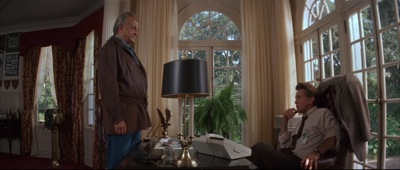
Now, with a film like "Firestarter," I would be remiss if I did not take a moment to talk about the casting. The film, when and if it is ever discussed, is probably brought up because it was the first vehicle for a young star named Drew Barrymore. Only two years after "E.T." someone thought it was a good idea to let a nine year old Barrymore attempt to carry a film. It didn't work.
That same someone probably also assumed that bringing in Martin Sheen (who'd just been featured in future Stephen King Decade subject "The Dead Zone") and George C. Scott (yeah, Patton) would also make this a can't miss. They would have been right if the definition of can't miss was sheer unintentional comedy gold. Sheen plays The Shop's head-honcho, and Scott plays a Native American (notice the pony-tail, duh) assassin who does all kinds of shady nonsense for The Shop. Much of "Firestarter" is worth watching if only to see these two old-hands chew the scenery and generally act like goofy, genre caricatures.
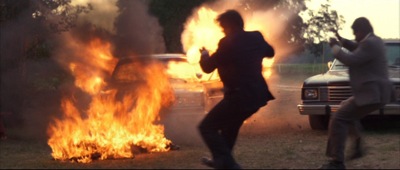
With much of the film's first act being taken up with flashback and exposition, things don't really get cooking until The Shop finally catches up with Charlie and Andy at an out of the way farmhouse. When it becomes clear that the agents won't be leaving without her, Charlie gets her firestarter act going. Her father, who has always told her to keep her power in check, seems ambivalent about her display of force, telling the men as they're being cooked alive: "She's never done anything like this before, I don't know if she'll be able to stop."
It's at this point that the film introduces the real monster — Charlie's latent destructive abilities. As we're told in no uncertain terms, Charlie's abilities are tied directly to her pituitary gland. The great fear on the part of The Shop is that when she hits puberty her powers will become unstoppable. Hmmmm, emerging female sexuality as a threat and cause of anxiety: where have I heard about that before? Oh right, virtually every goddamn horror movie ever made.
Much of "Firestarter" treads close to themes and even plot elements that King mined heavily for "Carrie" among other stories. In the book, this is handled with enough nuance so as to make it quite palatable (if my admittedly shaky memory is any judge), but in the film there's just not enough time to really do anything but give these concepts the broad stroke treatment. Thus, "Firestarter" never really equals other horror films that have walked this path. It would seem that the filmmakers were at least aware of these issues, as instead of trying to force Barrymore to do too much heavy dramatic lifting, they let their fire effects do most of the talking in the film's second half.
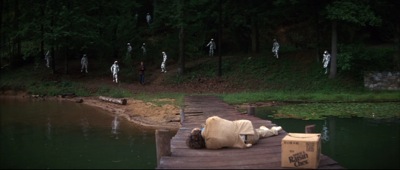
After their initial escape, Andy and Charlie are picked up by a team from The Shop led by Scott's John Rainbird. He's such a gnarly killer that he thought to use a sniper rifle to take down the pair. Fancy that, he must have been some sort of military genius to figure out that a sniper rifle was the best way to incapacitate a deadly foe. One can definitely see why he makes the big bucks. John Rainbird is also constantly coded as a humongous bad ass, as in this scene where a bunch of Shop guys approach a stunned Charlie in fire suits yet Rainbird just moseys up in his leather (and presumably Native American) jacket.
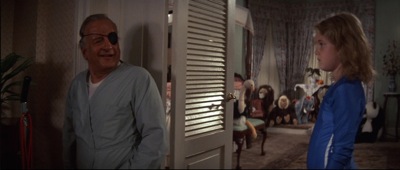
It's only a couple of scenes later when we find this badass character dressed up like a cleaning man, hired by The Shop to tidy up Charlie's room everyday. It's a thin disguise used solely for the purpose of befriending the girl and getting her to do The Shop's bidding, but she's nine, so it works like a charm. This whole interaction (which at times feels interminable) highlights the fact that all kids have to learn the all important "don't trust evil government conspirators" lesson at some point. Unfortunately for Charlie, the stakes were a little higher in her case.
There's not space to go into it here, but Scott's character has an awkward fascination with Charlie even before he is able to interact with her. At one point he demands that when their tests are run Sheen's character allow him to personally kill the little girl, so that he might see the vitality drain from her. Among all the characters, Rainbird seems to be the most threatened by Charlie's emerging powers (remember: code for sexuality) and thus he can very clearly be read as misogynistic, or at the very least regressive in his views on women's roles. It's interesting too that he's cast both as a Native American, and also always as someone "outside" — as he's not really part of The Shop, nor does Sheen truly embrace him or his methods.
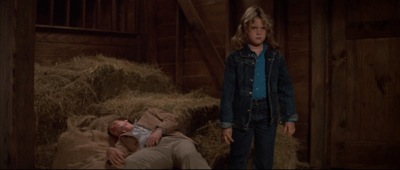
Though he may be a psychopath, Rainbird's ploy succeeds famously and The Shop may have gone on indefinitely functioning as part of the hapless bureaucratic machine had Andy not regained some of his powers and figured out how to escape. Of course, Rainbird throws a monkey wrench into things by shooting Andy as father and daughter were about to run. With his dying breath Andy drops some hard knowledge on his quickly wising daughter: "You let them know that this is a war. You make it so they can't do anything like this again. Burn it all down."
She responds with the words that the film has been building to from scene one: "For you daddy."
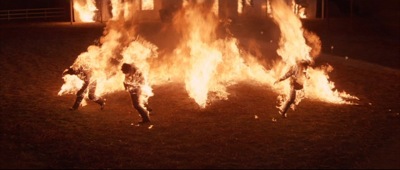
It's important to note that in a film that measures about two hours, almost a full tenth of the screen time is devoted to Charlie's climatic leveling of The Shop's compound. The fire that she unleashes is cathartic not just for Charlie and her father, who have been pursued for years for simply being "different"; it's also a release for viewers who have sat through one hour and 50 minutes of familial struggle and TV-movie level government shenanigans only to see some good old fashioned explosions. While there are a couple such fire sequences earlier in the film, in this climatic sequence, the deployment and filming of the fire literally reaches pornographic levels.
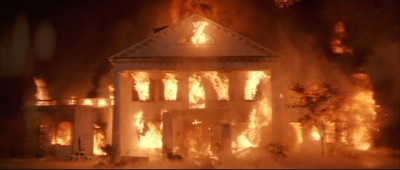
In the end, Charlie makes sure to leave no trace, by doing exactly what she had been authorized by her father to do. Her powers overflow to such an extent that eventually Charlie begins to shoot fireballs, which materialize out of the air and fly like missiles. Following up on the theme of sexual maturity, one could read Charlie as the prototypical victim-hero described by Carol Clover in the first chapter of her book "Men, Women, and Chainsaws." If this finale — where a put-upon young woman unleashes her fury, which has been closely tied to her emerging sexuality, onto her oppressors — sounds familiar, it's because it's virtually identical to "Carrie", King's first novel and the first King story that was turned into a film.
As in "Carrie", we are able to enjoy Charlie's monstrous destruction of The Shop because we have walked in her shoes and experienced at least a part of what she has been forced to experience. Upon watching her final remaining parent die, it would have been upsetting had Charlie done any less than bring the entire thing down. It's a King-ian twist (the same as he used in "Carrie") but again it's never a cut and dried horror story. While the climatic action fits firmly into the conventions of the genre, Charlie's origins and much of the third act, where she is being experimented on, are more reminiscent of sci-fi tropes. The two genres are similar in enough ways however, and cross pollinate so much that its never a distraction. Viewed through the lens of other King works though, "Firestarter" often feels like the thing that is different from the others.
One final nugget that I found humorous was the film's denouement, in which Charlie returns to live with the old couple on the farm who had provided them shelter toward the film's beginning. Before their capture, Andy had a foolproof plan to get The Shop off their backs: send letters to major newspapers and blow the whistle on the illicit government activity. (This leads to a surreal scene toward the middle of the film where Rainbird literally kills a post-man only to steal back the letters that Andy had tried to mail.) In an idealistic and what seems wholly unrealistic turn today, Charlie goes with the old couple to The New York Times building, where everyone looks at each other and declares that The Shop would never be bothering them again. That brand of naivete has all but left today's films, and I for one got a little nostalgic.

